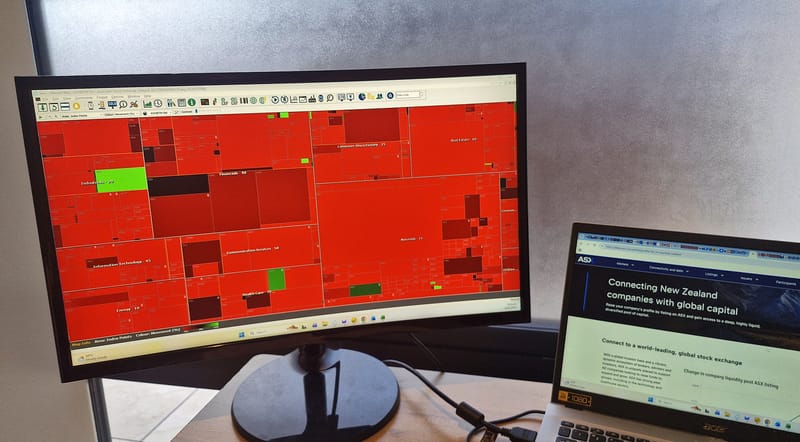NZ dollar slides to 7-mth low as revived nerves knock Wall St
Local jobs data are expected to show a tick up in the unemployment rate.

The New Zealand dollar fell to a seven-month low as general unease gripped global markets with Wall Street’s fear gauge – Cboe’s volatility index – spiking higher and US stock markets broadly weaker as the chiefs of Morgan Stanley and Goldman Sachs joined the chorus of voices nervous about the potential for a pullback in share markets.
Tesla was among those pacing declines ahead of the electric vehicle maker’s annual meeting where shareholders will be asked to approve chief executive Elon Musk’s US$1 trillion pay package, with Norway’s sovereign wealth fund – the Norges Bank Investment Management – saying it will reject the resolution, while Palantir Technologies sank lower despite reporting another quarter of record revenue.
Despite the sombre tone on Wall Street, Australian futures are pointing to a positive start for the S&P/ASX 200 index when trading opens across the Tasman, while New Zealand’s S&P/NZX 50 index bucked the trend on Tuesday as it touched a new all-time high, with Chorus’s annual meeting the latest corporate update coming today.
Meanwhile, Statistics New Zealand will release September quarter jobs figures today, which are expected to show a small lift in the unemployment rate, while the Reserve Bank will give its latest update on the health of the country’s financial stability in its six-monthly report.
Jittery markets
The kiwi dollar fell to its lowest level since April, trading at 56.56 US cents at 7am in Auckland from 56.94 cents yesterday as investors lost their nerve, with stock markets broadly weaker, the volatility index jumping 9.3% and Bitcoin sliding 5.2% to US$101,073.
Stocks on Wall Street declined, with the tech-heavy Nasdaq Composite down 1.6% in late trading and the S&P 500 falling 1%, with declines among the Magnificent 7 megacap companies.
Nerves were heightened by Goldman Sachs chief David Solomon and Morgan Stanley boss Ted Pick warning of a market correction after the strong run.
“On a down day, it’s always easy to find reasons for a selloff, such as investors taking a breather from the record run higher,” Bank of New Zealand senior markets strategist Jason Wong said in a note. “Also getting some attention, Goldman Sachs and Morgan Stanley CEOs and others have been speaking at a Global Financial Leaders Investment Summit, warning of high stock valuations and likelihood of some retrenchment in markets.”
Tesla was down 4.4% in late trading after Norway’s Norges Bank Investment Management said it will oppose Elon Musk’s proposed pay packet, pointing to the size of the award, dilution and lack of mitigation of key person risk as reasons for its decision.
Upbeat earnings didn’t spare companies from the slide, with Palantir Technologies, Pfizer and Uber Technologies among those reporting solid results but sitting on the red side of the ledger.
Lightening the load
Meanwhile, Eli Lilly & Co and Denmark’s Novo Nordisk both declined amid reports they're poised to announce new drug pricing deals with the White House in return for Medicare coverage of their products, including for their weight loss drugs.
Across the Atlantic, the UK’s FTSE 100 index nudged up 0.1%, with oil major BP up 1.3% after the company beat expectations and maintained its share buyback programme.
France’s CAC 40 fell 0.5% and Germany’s DAX 30 was down 0.8%.
Despite the downbeat tone, Australian futures are pointing to a 0.3% gain for the ASX 200 index when trading opens across the Tasman, while the NZX50 starts the day near an all-time high, having touched a peak on Tuesday.
Dairy prices were broadly weaker at the latest Global Dairy Trade auction, with the GDT index down 2.7% in its sixth straight decline, with an average winning price of US$3,768 a tonne. Whole milk powder prices fell 2.7% to an average US$3,503 a tonne, while butter prices dropped 4.3% to an average US$6,371 per tonne.
Chorus is holding a virtual annual meeting today, where three directors are up for re-election, including chair Mark Cross.
Local data include Stats NZ’s suite of September quarter jobs data, which are expected to show the unemployment rate ticked up to 5.3% from 5.2% in the prior year.
Meanwhile, the Reserve Bank of New Zealand will release its six-monthly financial stability report on the health of the country’s financial system. On Monday it released the results of its latest stress testing showing the major lenders were well placed to withstand and manage the impacts of a severe geopolitical shock.
Reporting by Paul McBeth. Image from Aditya Vyas on Unsplash.







